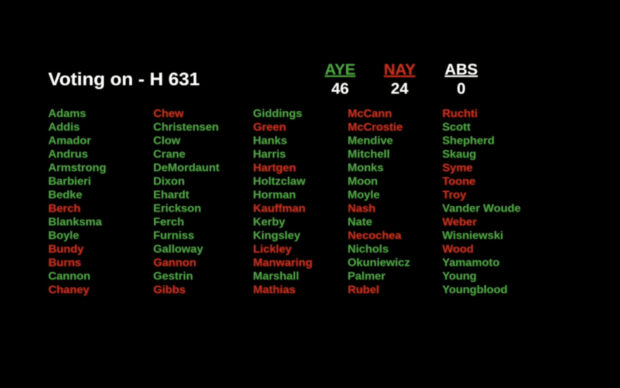Click here to read more about Rep. Judy Boyle’s committee debate centered on substitutes selling drugs to students.
A bill to make government mask mandates illegal — including those issued by public schools at all levels — cleared the House Monday.
While House Bill 631 is relatively fresh in the Statehouse, the debate and vote that sent it to the Senate were not.
Lawmakers traded verbal blows over what deserves to be called “science;” misinformation and mischaracterizations were spread; and though the mask mandate ban would apply to all government agencies, school mask mandates were in legislators’ crosshairs.
Debate over a similar bill last April had a similar flavor, and Monday’s split vote looked familiar. Last year, a ban passed 47-22. On Monday, an overlapping coalition passed HB 631 46-24.

In the hour or so of debate that proceeded Monday’s vote, proponents looped masks in with discussions of children’s mental health.
“I don’t know what better way to socially isolate the young,” said Rep. Tony Wisniewski, R-Post Falls. “We are turning everyone into xenophobes. Everyone is the enemy. We cannot trust them. They may be trying to give us a disease either intentionally or otherwise. We have done the best job of social isolation without going to a burqa system.”
The Centers for Disease Control advises that people two and older wear masks, as they help mitigate the spread of the coronavirus, which has killed 4,676 Idahoans to date. But multiple lawmakers outrightly and incorrectly stated that no face coverings of any kind have been shown to reduce the spread.
And Wisniewski claimed of COVID-19, “There is zero risk among the young,” after rattling off lower coronavirus death numbers for children.
Idaho has logged over 59,000 COVID-19 cases involving children, including two deaths.
“Someone listening to this debate could get the wrong information,” said House Assistant Minority Leader Lauren Necochea, D-Boise. “And it’s important to public health that people have accurate information right now.”
Rep. Heather Scott, R-Blanchard, also erroneously claimed that Elementary and Secondary School Emergency Relief, federal funds dedicated to helping K-12 schools recover from the pandemic, are being used to “incentivize these schools to vaccinate children.”
“And that’s why we’re having so much trouble with parents that are going to school boards and being ignored by the school board members — because they’re getting a lot of money,” Scott said.
An EdNews analysis of all available school district and charter plans to spend ESSER funding found no such incentive programs, and the federal government hasn’t mandated any of the incentives Scott claimed exist.
EdNews sought comment, but Scott didn’t immediately respond Monday afternoon.
Scott also falsely claimed that the same ESSER money “is bypassing our body, is bypassing the state and going straight into the schools,” even though she participated, dissentingly, in the House’s May vote to approve the largest pot of ESSER funds for schools’ use.
Monday’s debate came after committee hearings on HB 631 included two proponents claiming that people would widely wear masks if they were “dying in the streets.”
The bill, which would ban mask mandates for the purpose of preventing infectious disease, now heads to the Senate, where a similar proposal didn’t get a committee hearing and died last year.
Senate approves arts grants
Without debate, the Senate passed a supplemental budget for the State Board of Education, which includes $1 million for a one-time school arts grants program.
Senate Bill 1292 passed late Monday afternoon on a 29-4 vote. It now goes to the House.
School counselor eligibility change heads to House floor
A bill meant to make more counselors eligible to serve in schools passed the House Education Committee unanimously Monday.
House Bill 654 would allow licensed professional counselors and licensed clinical professional counselors to work with students. Both positions require a master’s degree, and the first requires 1,000 hours of professional experience while the latter requires 2,000.
Ken Marlowe, head of social-emotional learning at the Bonneville School District, testified that opening up school counseling jobs to more potential applicants is key as students continue suffering emotionally from the pandemic.
“Things are getting tougher and tougher for students, and the anxiety, the depression, suicide attempts, suicidal ideation is significant,” he said.
Supported by speakers from the Idaho School Boards Association and Idaho Education Association, Marlowe said existing requirements dissuade qualified counselors from working with universities to become certified school social workers.
“It’s a lot of time and it’s a lot of effort that — quite honestly — not many can stomach when they already have far surpassed many of the requirements to become a school counselor,” Marlowe said.
No one from the public or the committee debated against the bill. It now heads to the House floor.
New trustee recall bill resurfaces
Rep. Barbara Ehardt was back Monday morning with a rewrite — a new version of a bill addressing school trustee recalls.
Ehardt, R-Idaho Falls, wants to ensure that voters can elect a new trustee to replace a board member who has been recalled — or a board member who resigned under the threat of recall.
A similar bill passed the House last session, but did not pass the Senate.
The House State Affairs Committee quickly voted to introduce the new bill Monday morning, so it could come back for a full hearing at a later date.
A teacher pay tweak
House Education also passed a rewrite of a bill that would tweak the career ladder, Idaho’s salary schedule for teachers.
The bill would allow teachers coming from out of state and administrators returning to teaching to be paid the same amount as their peers. The revised bill included technical changes.
House Bill 656 was passed unanimously, and heads to the House floor.
Idaho Education News reporter Kevin Richert contributed to this report.
